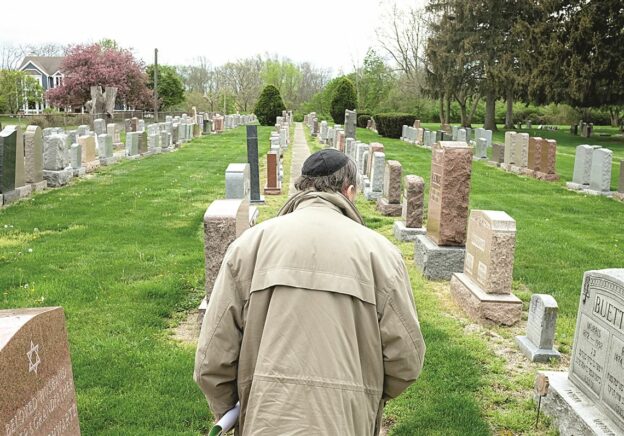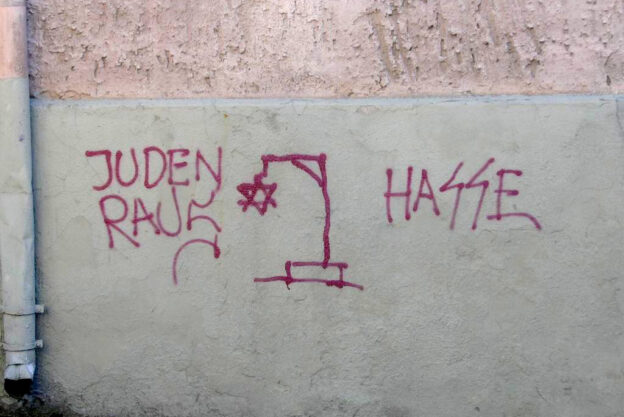An article about the effective outlawing of shechitah in EU countries that I wrote for Religion News Service, a media syndicate for religion stories, is here.


An article about the effective outlawing of shechitah in EU countries that I wrote for Religion News Service, a media syndicate for religion stories, is here.

Something about the news reports in the wake of the December 10, 2019 shooting at a kosher grocery in Jersey City store bothered me at the time, but I couldn’t quite put my finger on it. Novelist Dara Horn, in her new collection of essays, “People Love Dead Jews: Reports From a Haunted Present,” fingers it well.
She quotes the Associated Press report, which was picked up by many news outlets: “The slayings happened in a neighborhood where Hasidic families had recently been relocating, amid pushback from some local officials who complained about representatives of the community going door to door, offering to buy homes at Brooklyn prices.”
Ms. Horn wonders why other cases of domestic terrorism, like against black churches or nightclubs, aren’t similarly “contextualized” in an attempt to explain what motivated the murderer. And she muses further that “Like many homeowners, I too have been approached by real estate agents asking me if I wanted to sell my house. I recall saying, no, although I suppose murdering these people would also have made them go away.”
That dagger of a comment is one of many marvelously acerbic observations in Ms. Horn’s book.
Like her further observation on the Jersey City massacre, that when it comes to identifiably Jewish Jews, the crime for which they are persecuted, even killed, is the sheer audacity of “Jews, living in a place!”
Or like the story she tells at the book’s beginning, about the Anne Frank museum in Amsterdam, about an employee who donned a yarmulke one day and was told to cover it with a baseball cap. The museum relented after four months’ deliberation, which, Ms. Horn writes, “seems like a rather long time for the Anne Frank House to ponder whether it was a good idea to force a Jew into hiding.”
Zing.
Anne Frank inspires a further observation from Ms. Horn, about the most famous quote from the young girl’s diary, “I still believe, in spite of everything, that people are truly good at heart.”
Ms. Horn: “It is far more gratifying to believe that an innocent dead girl has offered us grace than to recognize the obvious: Frank wrote about people being ‘truly good at heart’ three weeks before she met people who weren’t.”
The writer journeyed to China, where she visited the Manchurian village of Harbin. Jews once lived there, until they were forced to flee or were killed in the 1930s by the invading Japanese army. Today, in tribute to the Jewish community that once thrived there, Harbin hosts a museum that replicates the once-Jewish part of the town, complete with shuls and stores. The writer’s suggestion for a name for such exhibits about former Jewish dwelling places: “Property Seized from Dead or Expelled Jews.”
The unifying theme of the essays in “People Love Dead Jews” — the author was surprised when her publisher actually accepted her suggestion for a title — is that all the concern and admiration for Jews seemingly reflected in memorials and museums and novels and movies comprises something other than true goodwill toward actual Jews today.
“I had mistaken the enormous public interest in past Jewish suffering for a sign of respect for living Jews.” she writes. But, she says she came to realize, “even in its most apparently benign and civic forms” it is “a profound affront to human dignity.” Focusing on dead Jews, Ms. Horn seems to be saying, avoids having to confront the reality of live ones.
The book’s final essay, unexpectedly and enthrallingly, focuses on the most recent Daf Yomi Siyum HaShas, where more than 90,000 Jews packed MetLife Stadium (and nearly 20,000 at Brooklyn’s Barclays Center, and countless others in locations across the continent and around the world). The essay bears the title “Turning the Page.”
Ms. Horn, who wasn’t raised, and doesn’t consider herself, Orthodox, opts to study Daf Yomi. By doing so, she says, “I turn the page and return, carried by fellow readers living and dead, all turning the pages with me.”
Don’t expect the world to understand, or even care about, us, she seems to be saying to fellow Jews. Just connect with one another, with all of us, and, most importantly, with our mutual spiritual heritage.
© 2021 Ami Magazine

Wanton murder of Jews was a prominent feature of Ukrainian history from time immemorial. But the most infamous massacre of Jews on Ukrainian territory came in 1941, when the Nazis and their Ukrainian friends massacred nearly 34,000 Jews within two days, at the ravine known as Babi Yar.
Jewish history, though, is full not only of tragedies but of unexpected twists and turns. To read what I mean, please click here.

Representative Alexandria Ocasio-Cortez offered an apology last Friday, but it was the wrong one.
She had decided at the last minute to vote “present” instead of “no” on a resolution to provide $1 billion in new funding for Israel’s Iron Dome missile defense system. And then reportedly had a crying spell after which she expressed regret for not actively opposing the resolution.
Her apology, instead, should have been for having even considered depriving Israel of the ability to protect innocent men, women and children from Hamas rockets.
The measure passed 420 to 9, but the handful of nay- or “present”- sayers showed some true and truly ugly colors.
Back in 2018, I defended Representative Ocasio-Cortez when she was under fire for comments that were construed as insensitive to the memory of the Holocaust. And defended her again, when, with regard to Israel, she was lumped together on no evidence with Israel-hating, antisemitic trope-spewers Representatives Rashida Tlaib and Ilhan Omar.
I had hoped that Ms. Ocasio-Cortez wouldn’t slip into the Tlaib and Omar mud pit and buy into the anti-Israel propaganda that has crazily come to be part of some progressives’ agenda (though not of responsible ones like the impressive Ritchie Torres).
Alas, my hopes were dashed.
She has repeatedly referred to Israeli security measures as “apartheid,” an accusation that distinguished South African Judge Richard Goldstone, who was charged by the U.N. Human Rights Council to lead an investigation of Israel/Hamas hostilities in 2008-2009, dismissed as defamatory. “In Israel,” he wrote in The New York Times, “there is no apartheid. Nothing there comes close to the definition of apartheid.”
And, after this past May’s Hamas attack on Israel, after which the Jewish state dared to retaliate by destroying terrorist bases and tunnels (and taking precautions to protect noncombatants that are unparalleled in any other military), Congresswoman Ocasio-Cortez blasted Israel for its “disproportionate” response, since there were more casualties, overwhelmingly terrorists, in Gaza than, thankfully, in Israel.
All that was emetic enough. Now the congresswoman is weepily apologizing for not voting to deprive Israel of an entirely defensive weapon. The Iron Dome system doesn’t threaten people; it destroys rockets aimed at people. And it has done so repeatedly, saving countless Israeli citizens’ lives. If ever there was a no-brainer when it comes to legitimate military assistance, this was it.
The problem is that Ms. Ocasio-Cortez has brains, plenty of them. Her opposition to a measure that can only save innocent lives must come from somewhere other than intelligence. Such irrationality is a regularly observed characteristic of antisemites.
I cannot know if the hearts of Ms. Ocasio-Cortez or the others who didn’t vote to approve the funding in fact harbor visceral hatred for Jews. But what I can know, based on their votes, is that they have something less than concern for Jewish lives.

https://www.nydailynews.com/opinion/ny-oped-anti-semitism-on-the-loose-20210826-lyc2iv4etzanvcbgku3r3cu7ei-story.html
New York Daily News, Aug. 26, 2021
by: Avi Shafran
A very old, very wry, very pointed Jewish joke:
Goldberg is in the waiting area of a European airport holding the handle of his large suitcase and looking agitated. He approaches one traveler and asks him, “What do you think about Jews?” The fellow smiles benevolently and responds, “They are very fine people.” Goldberg thanks him and moves to another person, asking the same question. The response: “All humans are equal and worthy of respect.” Then to a third traveler; same question, similar answer. Then another, and another. Ditto.
Eventually, though, one of the accosted responds differently: Taking a deep breath and glowering at his questioner, he says, “They’re the scum of the earth, greedy plotters to overtake the world, killers of babies, causers of wars and cheats!”
“Ah!” says Goldberg happily, looking heavenward. “Finally! An honest man!” And then, turning to the spewer of the hate, he asks “Would you mind watching my suitcase while I use the restroom?”
There are indeed regions of the world where the populaces, ignorant and gullible, can be relied upon to swallow and regurgitate the most hateful canards about Jews, and who are all too ready to hate people they’ve never met as a result.
But surely not in the Western world.
A few items from recent days:
August 19. A school, a synagogue and a bus shelter were spray painted with antisemitic messages in Toronto.
August 20. The Los Angeles County District Attorney charged two former Torrance police officers with vandalism for allegedly spray-painting a swastika on the back seat of a car.
August 21. A man punched a 64-year-old Orthodox Jewish man as they passed one another on the street in the heavily-Jewish neighborhood of Stamford Hill. Earlier in the day, the same man punched a Jewish child in the neighborhood. In a separate incident on Aug. 12, a 72-year-old Jewish man was slapped and had his kippah knocked off his head in another suspected hate crime in London.
August 22. Robert Smart, an evangelical Christian who lives in Florida, was outed as a prolific QAnon antisemite. He has more than 300,000 followers on Telegram, where, as “GhostEzra,” he posts Nazi propaganda, Holocaust denial and “a slew of conspiracy theories that often range from obliquely to explicitly antisemitic,” according to Logically, an organization that tracks disinformation online and uncovered his identity.
August 23. An 18-year-old Jewish man wearing a kippah in Cologne, Germany, was beaten by a group of 10 attackers in a public green space and taken to the hospital with a broken nose and cheekbone.
August 23. A man violently slapped a Jewish man in the face, in front of the victim’s wife and five children, at the children’s pool area of an Aventura, Florida hotel’s resort water park. The assaulter’s wife, according to police, called the victim’s wife a “dirty Jew.”
When, as occasionally happens, I meet a fellow Jew who is convinced that if you scratch any non-Jew hard enough, you’ll find an anti-Semite lurking beneath, I vociferously disagree. I’ve experienced (in addition, to be sure, to my share of Jew-hatred, including both verbal and physical assaults) too many acts of non-Jews’ kindnesses, and known too many good people who don’t share my religion or ethnicity.
And so the joke about Goldberg, I know, is an exaggeration. But perusing the news on almost any given day, I know, too, that exaggerations aren’t fabrications. They may overstate a case to make a point. But the point is often, as it is here, an entirely valid one.
Goldberg may be a joke. But antisemitism isn’t.

It has always struck me as ironic that the largest Jewish community in America, that is to say, New York’s, lives in a city named after an English one infamous for the killing of all its Jews.
A historical overview of the York Massacre and a reflection of the Church of England’s planned apology for its predecessors’ treatment of Jews comprise the focus of my most recent Ami column, which you can read here.

Most people, if they are familiar with the name at all, associate “Chateaubriand” with a meat dish. But François-René, vicomte de Chateaubriand was a famous French author who died in 1848. He was not well disposed toward Jews, considering them cursed for the farcical sin of deicide, and wrote approvingly about how “Humanity has put the Jewish race in quarantine.”
And yet, some other words of his are, even coming from so poisoned a pen, more than worthy for Jewish pondering during the annual period of the “Three Weeks” just begun, during which Jews mourn the destruction of the Holy Temples in Jerusalem and the Jewish exile. I am indebted to the late British Chief Rabbi Jonathan Sacks for, in his Haggada, bringing Chateaubriand’s words to my attention.
The French writer visited a desolated Jerusalem, where he saw Jews pining for the arrival of mashiach and the end of the Jewish exile.
And wrote as follows:
“This people has seen Jerusalem destroyed seventeen times, yet there exists nothing in the world which can discourage it or prevent it from raising its eyes to Zion. He who beholds the Jews dispersed over the face of the earth, in keeping with the Word of God, lingers and marvels. But he will be struck with amazement, as at a miracle, who finds them still in Jerusalem and perceives even, who in law and justice are the masters of Judea, to exist as slaves and strangers in their own land; how despite all abuses they await the King who is to deliver them… If there is anything among the nations of the world marked with the stamp of the miraculous, this, in our opinion, is that miracle.”
And a further miracle, may it come swiftly and in our days, will be the arrival of that king, and the end of our exile.
(c) 2021 Rabbi Avi Shafran

A piece I wrote about the misuse of the American flag was published by NBC-THINK on Flag Day, earlier this week. It can be read here.

I have defended Congresswoman Alexandria Ocasio-Cortez on a number of occasions in several public venues. But I was chagrined by her reaction to the recent Hamas/Israel war, and express why here.

My most recent Ami column can be read here.